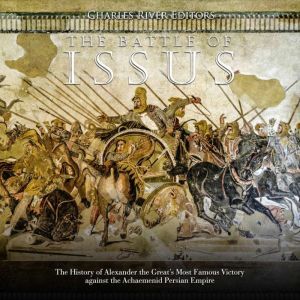

List: $6.95
| Sale: $4.87
Club: $3.47
The Battle of Issus: The History of Alexander the Great's Most Famous Victory against the Achaemenid Persian Empire
Author: Charles River Editors
Narrator: Daniel Houle
Unabridged: 2 hr 24 min
Format: Digital Audiobook Download
Publisher: Charles River Editors
Published: 02/05/2020
Categories: Nonfiction, History, Ancient History, Greece History, Egyptian History
Synopsis
At one point in antiquity, the Achaemenid Persian Empire was the largest empire the world had ever seen, but aside from its role in the Greco-Persian Wars and its collapse at the hands of Alexander the Great, it has been mostly overlooked. When it has been studied, the historical sources have mostly been Greek, the very people the Persians sought to conquer. Needless to say, their versions were biased, and attitudes about the Persians were only exacerbated by Alexander the Great and his biographers, who maintained a fiery hatred toward Xerxes I of Persia due to his burning of Athens. Ever since the famous Persian invasions that had been repelled by the Athenians at Marathon and then by the Spartans at Thermopylae and Plataea, Greece and Persia had been at odds. For the past few years they had enjoyed an uneasy peace, but that peace was shattered when, in 334 BCE, Alexander crossed the Hellespont into Persia. He brought with him an army of 50,000 infantry, 6,000 cavalry and a navy of over 100 ships, a mixed force of Macedonians, Greeks, Thracians and Illyrians, all chosen for their specific strengths (the Thessalians, for example, were famous cavalrymen). He was still just 22.Darius III, king of Persia at the time of Alexander’s invasion, was no tactical genius, but he was an intelligent and persistent enemy who had been handed the throne just before the arrival of the indomitable Alexander. His misfortune was to face an enemy at the forefront of military innovation and flexibility, a fighting force that he was not equipped to handle, and the unconquerable will of the Macedonian army, fueled by devotion to their daring and charismatic king. He would personally face Alexander twice, once at the Battle of Issus and again at the Battle of Gaugamela, and the battles would decide the fate of his empire and the fate of the Western world.